|
Message from the Executive Director
Patric Barbieri
|

A Letter We Hope Your Independent Child with Special Needs Writes You One Day
They may write it by hand, type it on a computer, have a person scribe it for them, or do it on Dragon speech recognition, or it could just be the words they are thinking that they want to say to you.
Dear Mom, Dad, brother, sister or guardian:
Today was a great day! I have finally found a job that I enjoy. This is a job where I have many natural supports
. I love going to work every day
. You know I have had many jobs over the past 20 years and most of them did not work out. Skills are good to have, but they aren't everything. Some jobs were too challenging, not because I couldn't do the work, but because I felt lonely. I didn't know how to interact with my co-workers or advocate for myself. I learned these skills, but using them in the real world is so different. Even though I could do the job, it wasn't a good match. I realized that it isn't always about the job itself; it is about the culture of the work environment and how people accept me for who I am. That is the best support you can receive.
People at my new job talk to me every day, they smile, and they accept me. I have noticed that a few of my co-workers have special needs too. This is the job I have been searching for. It only took 20 years!
On Friday night, we are going to visit another group home to watch a movie. They are my friends. We go there or they come to our house most Friday nights. It is my turn to pick the movie this week. After work tomorrow, I am going to look through my DVDs. On Saturday mornings, I go to an art class with Rebecca and Will from my group home. Art is my passion-you know that. I could stay there all day painting. On Saturday evening, we are going to a play in Boston, and then on Sunday, we will be going out to eat in the afternoon at a restaurant in the town center. On Mondays and Wednesdays, we all go to the gym.
I have many responsibilities in my home. I am on cooking duty every Wednesday, and we take turns doing other jobs in the house. This week, I have bathroom cleanup. This is the one job that I hate the most! But I am an adult now and these are the kinds of things I have to do.
When I first moved into this group home, I felt that I was going to be independent, but I had too much independence. I didn't really know how to be independent yet. You were not there telling me what I needed to do every day. I felt that the house managers and my roommates were getting angry with me all the time. They kept on having to remind me to do my house chores. I needed reminders to wake up, get ready for work, and pick out my own clothes. When I was late, there was a consequence, and I realized quickly that it was
up to me to learn how to be independent. I wished I was more prepared; it was really hard. We had many talks
about whose job it was to get ready on time. I wanted to be independent, but I was not as independent as I should have been. I know what to do now and I feel more like an adult. An adult with responsibilities. It feels good.
It is important that you know that I love you very much and I love coming home to visit you, but I can't wait to go back to my group home. I am sorry I can't come to visit this weekend. I am part of a family at my group home too; I care deeply about them, just like I care about you. I hope you understand. Spending time with you is fun, but I need my independence now that I am an adult living in my group home. I never knew what independence was until I lived away from home. It was just a word, a "concept" that they kept talking about in my IEP.
I am still learning and growing every day. I need to get better at many life skills and work habits. Some of my roommates are much more independent than I am, and this is a goal for me. I need to learn patience; I need to learn to wait;
I need to learn what it means to be good roommate; I need to learn that no one will be reminding me of every single thing that I need to do; I need to learn how to get along with people; I need to learn to share more; I need to think as an adult; I need to cry it out on my own. This has forced me
to confront my limitations of being independent.
You worry about me-I know you do. You have spent so many years trying to make me happy and keep me safe. The only thing you should worry about now is enjoying your life. If you want to make me happy now, make the time to do the things you love to do. That would really make me happy.
I am happy. I am an adult. I am being independent.
I love you,
Your loving son / Your loving daughter
Patric
|
New Experiences and Building New Relationships
By:
Rachele Leonardo
|
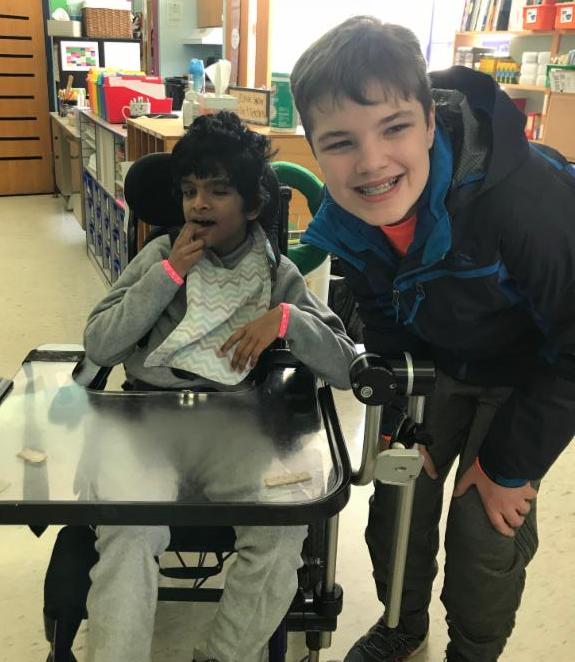 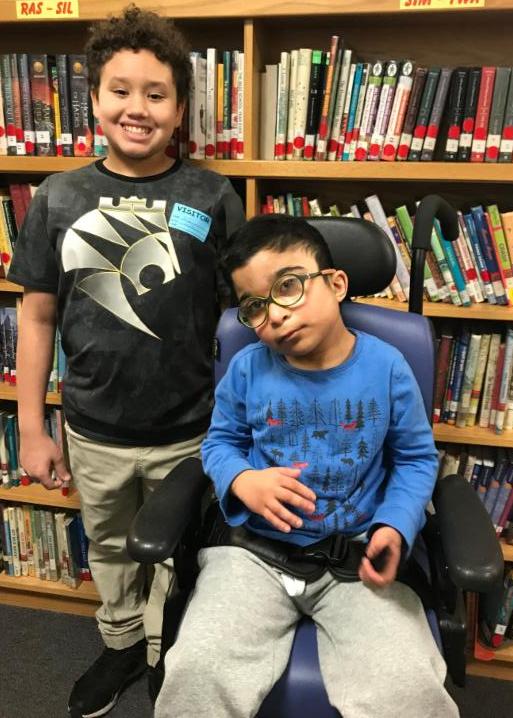
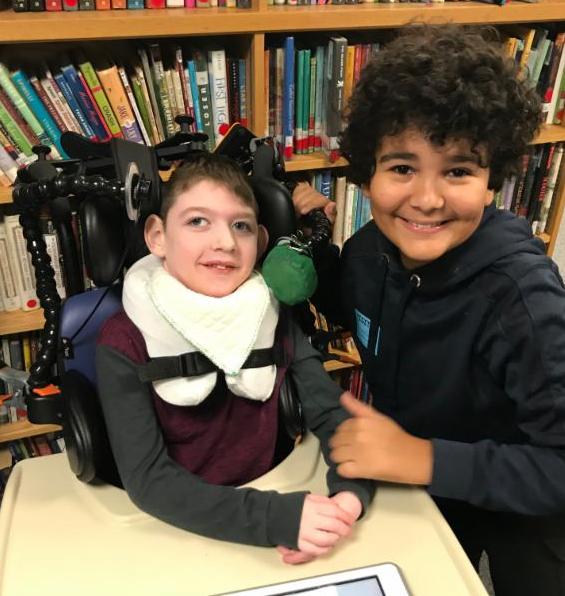
The Francis Wyman Elementary and John Glenn Middle School students got together the week before St. Patrick's Day for some festive activities! For the JGMS students, this was part of a disability awareness unit in their young adult group. Prior to the field trip, the JGMS students watched a powerpoint discussing disability awareness. We talked about different types of disabilities, but most importantly we discussed how every person has their own set of strengths and challenges, and that there is no wrong or right way to learn. After that, we did some activities to try and mimic what it might feel like to have a certain type of disability, so the students could experience stepping into someone else's shoes. For example, to mimic hearing impairments, the students wore headphones and tried to read the lips of another student as they spoke a short phrase. The activity was really fun, but the students came out of it with a better understanding of how challenging it might be to have certain disabilities.
Upon arrival to Francis Wyman, the JGMS students split up between Ms. Pappin's and Ms. Bennett's rooms. In Ms. Pappin's room, the JGMS students constructed a rainbow craft at the direction of the Francis Wyman students. In Ms. Bennett's room, the students played a rousing game of musical shamrocks. The John Glenn students lead the Francis Wyman students in various motor movements (i.e. clap your hands 5 times) depending on which shamrock they landed on. Soon, Ms. Pappin's room joined the game of musical shamrocks before everyone headed out for the leprechaun hunt. The student pairs took turns finding and reading the clues and traveling to various locations around the school. Finally, the students found the last clue, which led them to the library, the leprechaun (Ms. Terri), and the pot of gold (candy)!
Finally, the John Glenn students completed a reflection on this field trip as part of their keyboarding group the following week. One of the questions asked, "What would have made this trip even better?" Responses included, "if we could have done bowling," "if we had more time there," and "if we got to eat lunch in the cafeteria." Looks like we have a plan for our next visit!
|
|
April is OT Month!
By:
Lisa Poirier, MS, OTR/L
|
Just about everywhere I go, I get asked "What is Occupational Therapy?" It is a challenge to summarize, as most people assume that it has to do primarily with work, and it does, but work in the sense of "purposeful activities." The American Occupational Therapy Association defines occupation as the "thing that people of all ages participate in through the therapeutic use of everyday activities, or occupations." In essence, occupational therapy helps people of all ages improve their overall functionality from when they wake up in the morning to when they fall asleep. For example, we may help a person navigate their home safely or teach memory strategies if that is lost through illness or injury. As you can imagine, it is all encompassing and holistic and that may be why it is difficult to precisely define.
From a historical perspective, occupational therapy as a formal profession started in 1917, and while it has evolved into many practice areas, it has maintained the mission of helping people throughout the age span that may suffer from an injury, illness, or physical or intellectual disability. What is curious to note is that occupational therapists can be found everywhere. Many of the practice areas include schools, hospitals, wellness practices, outpatient clinics, home care agencies, skilled nursing facilities, and in the mental health field.
At the LABBB Collaborative, we have 8 occupational therapists and 2 certified occupational therapy assistants that serve children from the ages from 3-22 years old. As occupational therapists, our role is to assess and analyze, through the lens of education, where in the developmental process our student is and problem solve ways to either remediate a deficit area, accommodate for it through adaptive equipment, and/or modify the environment so that our student can have success within their curriculum. In no way can we do this alone at the LABBB Collaborative. We rely on working with our team members, such as our administrators, teachers, teacher assistants, speech therapists, physical therapists, mental health counselors, vocational counselors, and work site coaches to help us problem solve and manage our student's experience.
Given the entirety of what we work on, understandably, confusion often happens when our students move through grades and subsequently change schools. As one can imagine, occupational therapy looks much different at each developmental stage. For example, in elementary school, the student's fine motor abilities are emerging, and hence, the focus may be on activities of daily living such as buttoning/zipping coats, cutting food, tying shoes, using the bathroom, washing hands, using utensils and/or managing school/personal belongings. Handwriting is also a big consideration at this stage. To facilitate brain development, the occupational therapist may also engage the student in purposeful play and leisure activities within their interest area. Middle school therapists will continue to refine fine motor coordination tasks, handwriting, and activities of daily living. Considering that our brains are still developing at this age, these therapists may also introduce higher level skills such as executive functioning tasks (such as planning organizing, memory strategies) during tasks within a functional setting.
The biggest shift in focus is in high school, where skills previously learned are fostered to be further developed and generalized across all of the settings. For example, at this stage, our students may start either volunteering, interning, or working in many areas such as LABBB supported worksites in addition to their community and classroom settings. The occupational therapist and team assess if our students can carry over what they have previously learned to date. We may also work on tasks such as shopping, cooking, laundry, health and wellness, banking, comparing prices, safety, and travel training using the bus or the MBTA. While fine motor tasks such as handwriting is not a primary focus at this age, we integrate these skills into our functional activities such as practicing opening packages, chopping vegetables and handling money.
A big focus of occupational therapy in all settings is helping our students self regulate their bodies and minds. In other words, we assess what part of our student's sensory system needs regulating (ex. Does the student need a quiet break? Is it too loud in the classroom? Does the student need to regularly move their body and/or use a rocker chair or a hand fidget in order to focus and learn new information?). At the LABBB Collaborative, we regularly lead our students with alerting activities such as movement/yoga, or calming activities such as breathing/mindfulness. One of our core values at LABBB is teaching mindfulness, and we are thrilled that we are beginning to see a difference in our classrooms.
More information about Occupational Therapy can be found on
www.aota.org
.
|
"The Shirt off your Back"
By: Amanda O'Leary
|
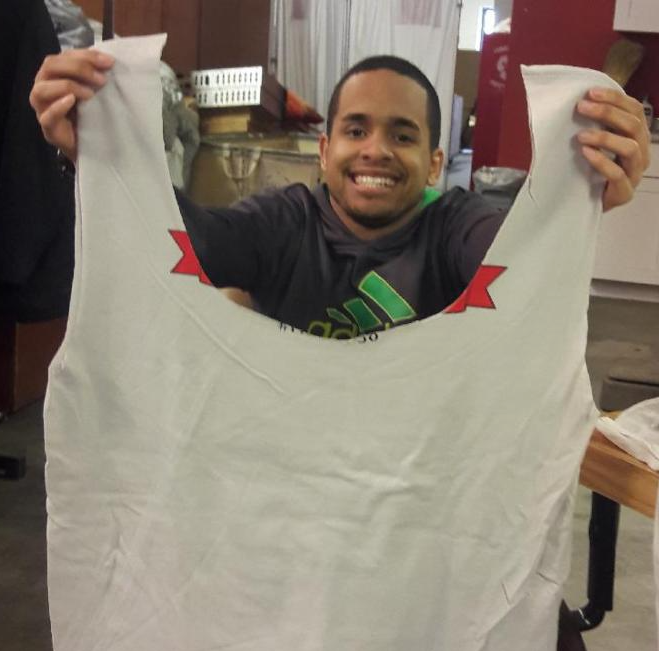 Fun and exciting opportunities continue to be happening for LABBB's Transition Department. After the holiday break, one of our community partners, Rob Gogan, Harvard University's Recycling and Waste Services Manager, spoke to our Site Instructor, Gianna Carrabino, about a possible project. Rob had a surplus of uniforms, particularly tee shirts, and wanted to find a way to "upcycle" them. Harvard logos must be cut off before they are allowed to leave the building. This renders them unusable, except as rags. Rob knew of some organizations, such as local food pantries and senior centers, that welcomed reusable bags and he has held several bag drives for Cambridge since the ban on plastic bags began. Gianna was able to find some tutorials online on turning old tee shirts into reusable bags, and with that, a plan was born - "The Shirt Off Your Back" bags! Thank you, Tim Callahan, for the creative project name!!!! Our hope is that with more and more towns banning plastic bags, the need for these will grow locally. Fun and exciting opportunities continue to be happening for LABBB's Transition Department. After the holiday break, one of our community partners, Rob Gogan, Harvard University's Recycling and Waste Services Manager, spoke to our Site Instructor, Gianna Carrabino, about a possible project. Rob had a surplus of uniforms, particularly tee shirts, and wanted to find a way to "upcycle" them. Harvard logos must be cut off before they are allowed to leave the building. This renders them unusable, except as rags. Rob knew of some organizations, such as local food pantries and senior centers, that welcomed reusable bags and he has held several bag drives for Cambridge since the ban on plastic bags began. Gianna was able to find some tutorials online on turning old tee shirts into reusable bags, and with that, a plan was born - "The Shirt Off Your Back" bags! Thank you, Tim Callahan, for the creative project name!!!! Our hope is that with more and more towns banning plastic bags, the need for these will grow locally.
The process to turn shirts into bags is one that can involve different types of learners. The shirts will need to be washed, cut, sewn, wrapped, labeled, and delivered. The skills needed to perform these tasks can involve a variety of students. A number of local senior centers and food pantries are interested in having the bags to give out to their clients and consumers. Our students who participate in Habitat for Humanity at Harvard will focus on the cutting, while some of our TRAC students will focus on the assembly and delivery of the bags. This endeavor is another wonderful opportunity for our students to make connections in our local communities.
|
| Clinical Corner:
Consistent and Predictable Are Key!
By Kaitlin Taylor, M.S., BCBA, LABA
|
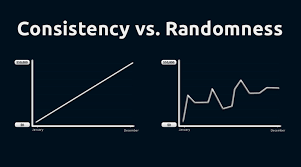 Have you ever noticed how hard it is to lose weight when you eat really healthy for breakfast, lunch, and dinner, but then have a huge bowl of ice cream for dessert every day? Or how challenging it is to increase your running stamina when you only go to the gym once a week...or once a month? That is because your dieting and workout are not consistent. Have you ever noticed how hard it is to lose weight when you eat really healthy for breakfast, lunch, and dinner, but then have a huge bowl of ice cream for dessert every day? Or how challenging it is to increase your running stamina when you only go to the gym once a week...or once a month? That is because your dieting and workout are not consistent.
What gets in the way of you being consistent? Is it the fact that you never know what you are going to eat until right before that meal? Or is it because you only go to the gym when you are feeling 100% and have some cute workout gear ready? If that's the case, then your schedule is not predictable.
The things that make it difficult for adults to make noticeable and long-lasting changes in their diet and exercise routines are exactly the things that make it difficult for our students to make noticeable and long-lasting changes in their day.
Consistency and predictability are crucial components of any and all behavior change programs, whether they focus on skill acquisition or reducing challenging behaviors. The more consistent and predictable you are with expectations and responses, the more likely it is that your student will learn a new skill or stop engaging in that challenging behavior that gets in the way of a successful day.
If you are having a hard time being consistent and predictable, think of what you can do to support yourself with increasing these aspects of your behavior. Maybe you need to incorporate a weekly schedule, checklist, or reminder system into your routine. Maybe you need to record certain aspects of your routine to make sure you did them (think MyFitnessPal, budget apps, crossing it off on your calendar), or maybe you just need to establish a routine. Whatever that change may be, just make sure it is consistent and predictable. If it is, then you will start to see a change!
|
Health Tips from the Health Office at AHS
By: Sylvana Weinstein, Nurse at AHS
|
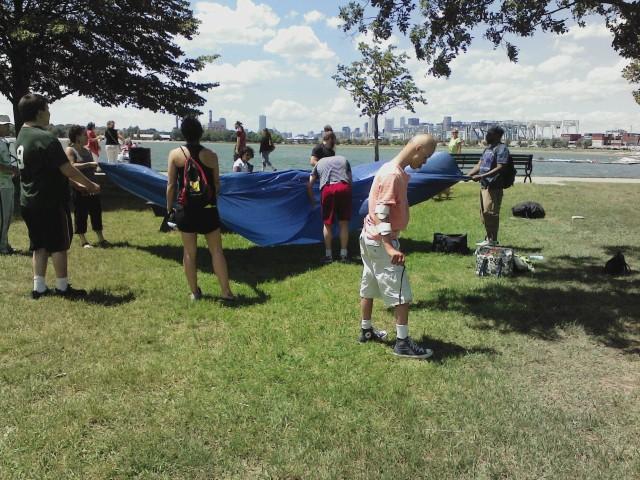 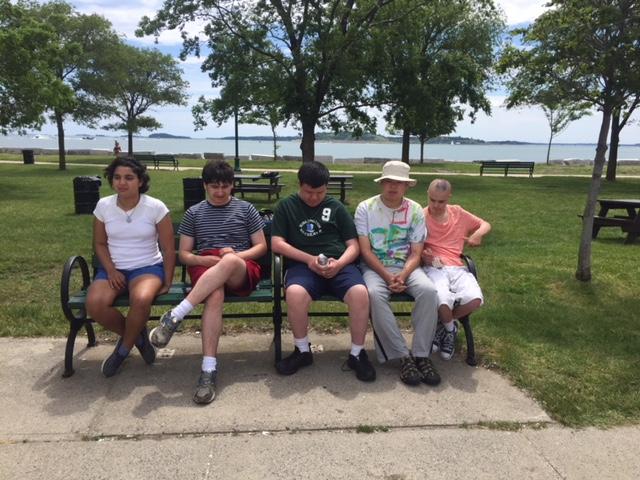 Research has shown [1] that we spend 93% of our life inside; 87% in buildings and 6% in cars. Research shows that in the 1970s - 1980's children spent 2 hours a day outside on weekdays and 9 hours outdoors on the weekends, rain or shine. The study stated that in 2013, 5 years ago, those numbers were half that of the 1970's[2]. Chances are, time outside has decreased even more over the last 5 years with increasing use of cell phones and devices. Many of us know that getting outdoors helps the body, mind, and spirit. Going outside also helps connect us to those with whom we go. How does it help? It helps by:
Research has shown [1] that we spend 93% of our life inside; 87% in buildings and 6% in cars. Research shows that in the 1970s - 1980's children spent 2 hours a day outside on weekdays and 9 hours outdoors on the weekends, rain or shine. The study stated that in 2013, 5 years ago, those numbers were half that of the 1970's[2]. Chances are, time outside has decreased even more over the last 5 years with increasing use of cell phones and devices. Many of us know that getting outdoors helps the body, mind, and spirit. Going outside also helps connect us to those with whom we go. How does it help? It helps by:
1)
Boosting Creativity and Focus
2)
Improving Mood & Self Esteem
3) Increasing Vitamin D level
4) Improving workouts: "Green Excercise" excercise in nature
5) Light has psychological healing properties
6) Grounding or being barefoot on the ground has anti-inflammatory and antioxidant properties[3]
As our teens are getting older, they want to go out less and less, especially in the colder weather. We can do simple things everyday in all weather above say 20 degrees. Some ideas for field trips at school or places you can take your children at home are:
1) Nearby town, walking beneath the trees close to school
2) Menotomy Rocks Park, Arlington;
3) Castle Island, Boston;
4) Habitat, Belmont;
5) Beaver Brook Reservation, Belmont;
6) Mary Cummings Park, Burlington;
7) Falling Creek Park, Bedford;
The cited research, as well as well as at least one LABBB Collaborative Nurse, says it is valuable to make and take the time to get outside on a regular basis, the greener the better!
Enjoy the outdoors!
[1]
https://snowbrains.com/brain-post-much-time-average-american-spend-outdoors/
[2]
https://fitness.mercola.com/sites/fitness/archive/2015/03/06/spending-time-outdoors.aspx
[3]
https://www.ncbi.nlm.nih.gov/pmc/articles/PMC4378297/
|
Flat Stanley
By: Jessie Niland
|
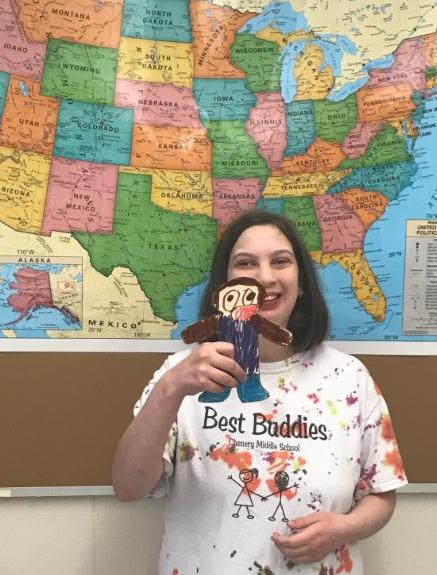 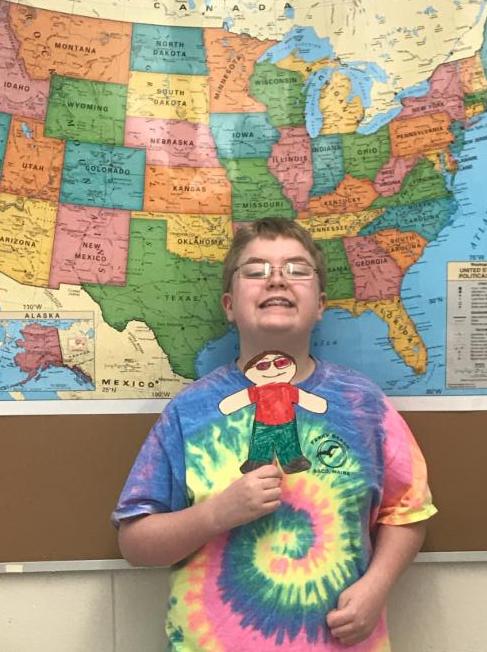 The students of room 111 have been learning about the United States as well as reading the novel Flat Stanley, by Jeff Brown. In the story Flat Stanley, Stanley is a boy who gets flattened by a bulletin board. Stanley is not hurt, but he is able to go in the mail to travel all around the world. To get first hand information about different states, the students will be sending their own Flat Stanley around the country. Students were excited to decorate their own Flat Stanley and can't wait to send them on April vacation in different states.
The students of room 111 have been learning about the United States as well as reading the novel Flat Stanley, by Jeff Brown. In the story Flat Stanley, Stanley is a boy who gets flattened by a bulletin board. Stanley is not hurt, but he is able to go in the mail to travel all around the world. To get first hand information about different states, the students will be sending their own Flat Stanley around the country. Students were excited to decorate their own Flat Stanley and can't wait to send them on April vacation in different states.
The class has done a wonderful job connecting the story with what they have been learning about the 50 states. The students are looking forward to tracking their Flat Stanelys' journeys and eagerly await responses from friends and family around the country!
|
|
Read Across America
By: Jessica Stuart
|
On March 2 we celebrated Dr. Seuss' birthday. As a school, we all sat cozily along the walls of the hallways outside of our classrooms and read silently to celebrate "Read Across America."
After reading with friends, the students made an art project of "The Cat in the Hat." It was a wonderful way to celebrate the joy of reading!
|
| Lucky Punch Boxing & Fitness |
|
|
| Boston University Autism Research Study |
|
|
|
Recreation News and Events
By:
Paula Rizzo, Integration and Recreation Coordinator
|
Recreation Updates
The LABBB Basketball Team A, won Runner Up at the GBBL Tournament. They celebrated the season with Teams B and C at a Banquet luncheon at Via Lago's.
Our annual Disney trip was a great success. We had great weather for fun in the parks, swimming, and meeting new friends. We had dinner at the Fantasmic Theater at Hollywood Studios followed by the Fantasmic show. Additional meals included a character dinner at Mickey's BBQ at Wilderness Campground and dinner at Rain Forest Café in Animal Kingdom. We even had VIP seating for the Lion King Show at Animal Kingdom.
T
uesday and Thursday bowling groups have started again along with Wednesday Recreation.
We look forward to seeing parents/family/friends at the Glow Golf Fundraiser on Thursday, April 26. This is an event for the adults to have some fun in the dark. Please see the attached flyer for information.
Special Olympics are coming up May 2, 2018. All registration forms should have been received by April 2nd for all athletes.
- 2-Beginner Kayaking programs
-
Dates: 6/12/18 and 6/19/18 (Tuesdays)
-
-
Lake Cochituate in Wayland
- Flight Simulation Center.
-
We will start with a one day trip (date TBD), then possibly look into a monthly trip if we have the interest.
We are also looking into doing some hiking trips as a day trip and overnight. Stay tuned.
|
|
Glow Golf Fundraising Event
|
|
|
|
|
Special Olympics is celebrating its 50th year (1968-2018) and we had the opportunity to interview Mary Beth McMahon, President and CEO of the Special Olympics Massachusetts. We discuss the past, present and future of the Special Olympics and how this organization is continuing to grow and evolve. LABBB has been involved with the Special Olympics since the late 1970's and we have a long history of bringing the games to our student athletes in collaboration with the Best Buddies organization. Paula Rizzo, LABBB Recreation and Integration Coordinator, joins us for this episode and she talks about her involvement with special since she was in high school as a student leader. We were on location at Special Olympics Headquarters in Marlborough MA for this episode so tune in and learn more about the future of Special Olympics. Please visit the special olympics website for more information:
www.specialolympicsma.org
More Episodes:
|
|